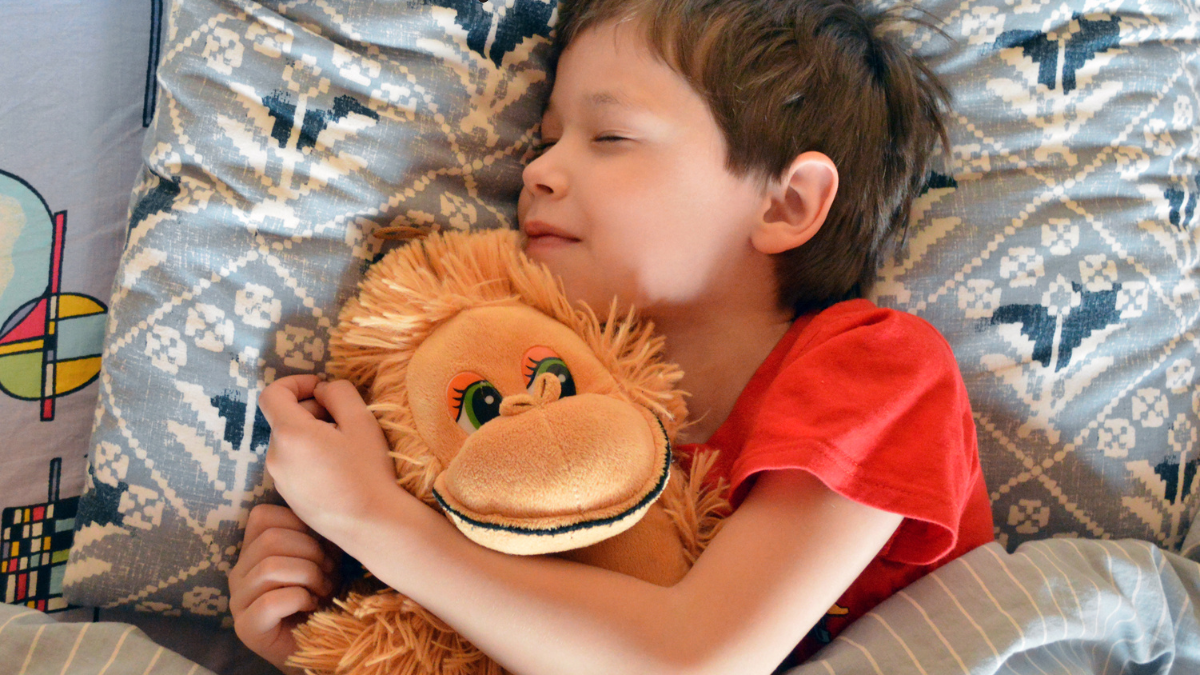I don’t know about you, but mornings used to be the most stressful part of the day. It felt like I was constantly tiptoeing the line between getting everyone up on time and keeping the peace.
But over time, I realized something: how kids wake up sets the tone for their entire day. Once I began focusing on creating a calm and gentle wake-up experience, things shifted—for the better.
Here’s what I’ve learned through experience, a lot of trial and error, and paying closer attention to how children sleep and respond to their environment.

How to wake up sleeping children
1. Understand How Kids Sleep
The first tip I have for you on how to wake up sleeping children is to understand how kids sleep. Before I could help any child wake up without resistance, I had to understand how their sleep works.
School-aged kids usually need about 9–12 hours. Knowing this helped me better set bedtime expectations and make sure they weren’t waking up cranky simply because they were still tired.
It turns out kids need different amounts of sleep depending on their age. Babies might sleep up to 17 hours a day (no wonder they’re so peaceful), while preschoolers are good with around 12–14.
Another thing I found fascinating was learning about sleep cycles—particularly REM and non-REM sleep. Waking a child during deep sleep often led to groggy, grumpy mornings. But if I waited for a lighter sleep stage (you can kind of tell—they may stir or move around a bit), wake-up time was so much smoother.
Related: 7 Engaging Memory Games for Kids
2. Create a Morning Routine That Sticks
A predictable morning routine changed everything for me. It helped eliminate the chaos that often came with unpredictable mornings. I started by waking the kids at the same time every day, even on weekends (yes, consistency really helps).
Then I introduced small steps: soft music, opening the blinds slowly, and giving them a few minutes to just stretch in bed before jumping into the day.
We also added little things they could do themselves—like picking out clothes or making the bed. These tasks gave them a sense of ownership and made mornings feel less like a rush and more like a rhythm.

3. Use Natural Light to Your Advantage
One of my favorite tricks is using natural light. I started placing their bed closer to the window and opening the curtains right before it was time to get up. That slow flood of sunlight really helped their bodies adjust naturally. On cloudier mornings, I use a sunrise alarm clock that mimics the effect of daylight creeping in. It’s a game-changer—no more flipping on a light and getting groans in return.
Related: How to Make Your Kids Genius
4. Wake Them with Gentle Sounds
Gone are the days of jarring alarms. Instead, I started using soft music or nature sounds—like birds chirping or waves rolling. It’s like easing into the day instead of being shoved into it. I even tried a sound machine that slowly increases in volume, and the difference in mood was immediate. They wake up more relaxed, and honestly, so do I.
5. Make Mornings Fun
Who says mornings have to be boring? I started making mornings more fun, especially on weekdays when motivation was low. A quick yoga stretch together, a silly story to start the day, or even a mini scavenger hunt to find socks or breakfast items—it all adds a little joy and makes waking up feel less like a chore.
Related: How To Raise School-Age Kids
6. Add Warmth and Snuggles
Sometimes, all it takes is a warm blanket and a little cuddle time to gently ease them into wakefulness. There’s something comforting about physical closeness in the morning. If I wake them with a little tickle or snuggle next to them for a few minutes, they usually wake up smiling. It’s these small moments of connection that make the biggest difference.
Related; How to Set Boundaries with Kids
7. Give Them Simple Choices
Another trick I use? Giving them a say in the morning. Whether it’s choosing between two outfits or picking their breakfast from a few healthy options, those little choices make them feel in control. I even made a fun “choice chart” for the week—it’s now something they look forward to, and it keeps us both on track.
8. Use Scents to Gently Wake Them Up
I hadn’t realized how much scent could play a role in wakefulness until I started experimenting. The smell of something delicious in the kitchen—like cinnamon oatmeal or even just freshly brewed coffee—can lure even the sleepiest kid out of bed. I’ve also used citrus essential oils in a diffuser to perk up the room. Lemon or orange scents work wonders for brightening the mood (and waking up the brain).
9. Adjust Bedtime for Better Mornings
Lastly, I had to look at bedtime. If mornings were rough, it almost always traced back to a late night. Slowly adjusting bedtime—just 15 minutes earlier every few nights—helped a lot. And I made sure their nighttime routine was just as calming as the morning one. No screens, dim lights, a cozy bedtime story, and a quiet room all made falling asleep easier. Better sleep at night meant way better mornings.
Final Thoughts
I’ve learned that waking up kids gently isn’t just about avoiding tantrums—it’s about starting the day with connection, calm, and care. It’s not always perfect, but the difference has been huge. Mornings used to feel like a battleground, but now? They’re moments I actually look forward to. And I think the kids do too.
Save the pin for later

- 8 Reasons You Wake Up Tired After A Full Night Sleep - 13/02/2026
- 150 Juicy Never Have I Ever Questions for Teenagers - 12/02/2026
- My Partner Is Always Angry And Negative: Here’s What To Do - 11/02/2026
